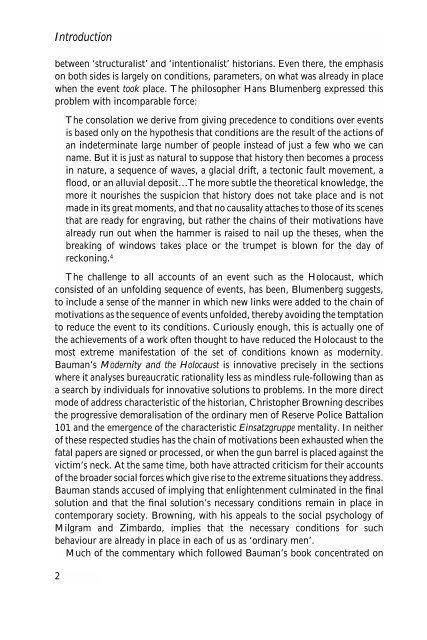You also want an ePaper? Increase the reach of your titles
YUMPU automatically turns print PDFs into web optimized ePapers that Google loves.
Introduction<br />
between ‘structuralist’ and ‘intentionalist’ historians. Even <strong>the</strong>re, <strong>the</strong> emphasis<br />
on both sides is largely on conditions, parameters, on what was already in place<br />
when <strong>the</strong> event took place. The philosopher Hans Blumenberg expressed this<br />
problem with incomparable force:<br />
The consolation we derive from giving precedence to conditions over events<br />
is based only on <strong>the</strong> hypo<strong>the</strong>sis that conditions are <strong>the</strong> result of <strong>the</strong> actions of<br />
an indeterminate large number of people instead of just a few who we can<br />
name. But it is just as natural to suppose that history <strong>the</strong>n becomes a process<br />
in nature, a sequence of waves, a glacial drift, a tectonic fault movement, a<br />
flood, or an alluvial deposit…The more subtle <strong>the</strong> <strong>the</strong>oretical knowledge, <strong>the</strong><br />
more it nourishes <strong>the</strong> suspicion that history does not take place and is not<br />
made in its great moments, and that no causality attaches to those of its scenes<br />
that are ready for engraving, but ra<strong>the</strong>r <strong>the</strong> chains of <strong>the</strong>ir motivations have<br />
already run out when <strong>the</strong> hammer is raised to nail up <strong>the</strong> <strong>the</strong>ses, when <strong>the</strong><br />
breaking of windows takes place or <strong>the</strong> trumpet is blown for <strong>the</strong> day of<br />
reckoning. 4<br />
The challenge to all accounts of an event such as <strong>the</strong> <strong>Holocaust</strong>, which<br />
consisted of an unfolding sequence of events, has been, Blumenberg suggests,<br />
to include a sense of <strong>the</strong> manner in which new links were added to <strong>the</strong> chain of<br />
motivations as <strong>the</strong> sequence of events unfolded, <strong>the</strong>reby avoiding <strong>the</strong> temptation<br />
to reduce <strong>the</strong> event to its conditions. Curiously enough, this is actually one of<br />
<strong>the</strong> achievements of a work often thought to have reduced <strong>the</strong> <strong>Holocaust</strong> to <strong>the</strong><br />
most extreme manifestation of <strong>the</strong> set of conditions known as modernity.<br />
Bauman’s Modernity and <strong>the</strong> <strong>Holocaust</strong> is innovative precisely in <strong>the</strong> sections<br />
where it analyses bureaucratic rationality less as mindless rule-following than as<br />
a search by individuals for innovative solutions to problems. In <strong>the</strong> more direct<br />
mode of address characteristic of <strong>the</strong> historian, Christopher Browning describes<br />
<strong>the</strong> progressive demoralisation of <strong>the</strong> ordinary men of Reserve Police Battalion<br />
101 and <strong>the</strong> emergence of <strong>the</strong> characteristic Einsatzgruppe mentality. In nei<strong>the</strong>r<br />
of <strong>the</strong>se respected studies has <strong>the</strong> chain of motivations been exhausted when <strong>the</strong><br />
fatal papers are signed or processed, or when <strong>the</strong> gun barrel is placed against <strong>the</strong><br />
victim’s neck. At <strong>the</strong> same time, both have attracted criticism for <strong>the</strong>ir accounts<br />
of <strong>the</strong> broader social forces which give rise to <strong>the</strong> extreme situations <strong>the</strong>y address.<br />
Bauman stands accused of implying that enlightenment culminated in <strong>the</strong> final<br />
solution and that <strong>the</strong> final solution’s necessary conditions remain in place in<br />
contemporary society. Browning, with his appeals to <strong>the</strong> social psychology of<br />
Milgram and Zimbardo, implies that <strong>the</strong> necessary conditions for such<br />
behaviour are already in place in each of us as ‘ordinary men’.<br />
Much of <strong>the</strong> commentary which followed Bauman’s book concentrated on<br />
2

















